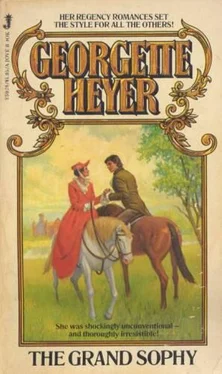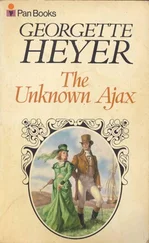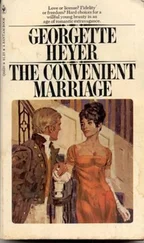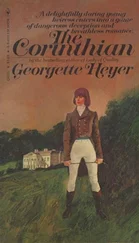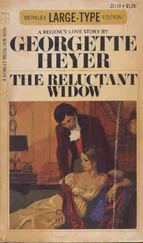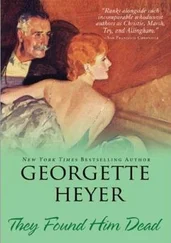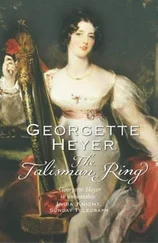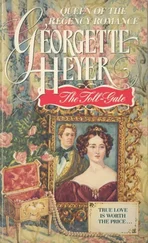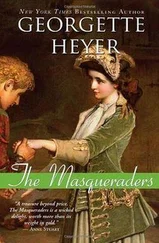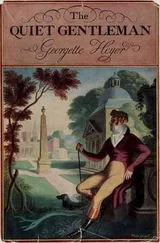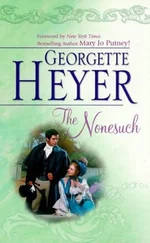BUT it was not until the Easter holidays were a week old that Sophia arrived in Berkeley Square. The only intelligence received by her aunt during the intervening ten days was a brief scrawl from Sir Horace, conveying the information that his mission was a trifle delayed, but that she would assuredly see her niece before very long. The flowers which Cecilia so prettily arranged in her cousin’s room withered and had to be thrown away; and Mrs. Ludstock, a meticulously careful housekeeper, had twice aired the sheets before, in the middle of a bright spring afternoon, a post chaise and four, generously splashed with mud, drew up at the door.
It so happened that Cecilia and Selina had been driving with their Mama in the Park, and had returned to the house not five minutes earlier. All three were just about to ascend the staircase when Mr. Hubert Rivenhall came bounding down, uttering, “It must be my cousin, for there is a mountain of baggage on the roof! Such a horse! By Jupiter, if ever I saw such a bang-up piece of flesh and blood!”
This extraordinary speech made the three ladies stare at him in bewilderment. The butler, who had only a minute before withdrawn from the hall, sailed back again with his attendant satellites, and trod across the marble floor to the front door, announcing, with a bow to his mistress, that he apprehended Miss Stanton-Lacy had that instant arrived. The satellites then threw open the double door, and the ladies had a clear view not only of the equipage in the road but of the awed and inquisitive faces of the younger members of the family, who had been playing at bat-and-ball in the garden of the Square and were now crowded close to the railings, gazing, in spite of Miss Adderbury’s remonstrances, at the animal which had brought Hubert in such pelting haste down the stairs.
Miss Stanton-Lacy’s arrival was certainly impressive. Four steaming horses drew her chaise, two outriders accompanied it, and behind it rode a middle-aged groom, leading a splendid black horse. The steps of the chaise were let down, the door opened, and out leaped an Italian greyhound, to be followed a moment later by a gaunt-looking female, holding a dressing bag, three parasols, and a bird cage. Lastly, Miss Stanton-Lacy herself descended, thanking the footman for his proffered help, but requesting him instead to hold her poor little Jacko. Her poor little Jacko was seen to be a monkey in a scarlet coat, and no sooner had this magnificent fact dawned on the schoolroom party than they brushed past their scandalized preceptress, tore open the garden gate, and tumbled out into the road, shouting, “A monkey! She has brought a monkey!”
Lady Ombersley, meanwhile, standing as though rooted to her own doorstep, was realizing, with strong indignation, that the light in which a gentleman of great height and large proportions regarded his daughter had been misleading. Sir Horace’s little Sophy stood five feet nine inches in her stocking-feet, and was built on generous lines, a long-legged, deep-bosomed creature, with a merry face, and a quantity of glossy brown ringlets under one of the most dashing hats her cousins had ever seen. A pelisse was buttoned up to her throat, a very long sable stole was slipping from her shoulders, and she carried an enormous sable muff. This, however, she thrust into the second footman’s hands so that she was the better able to greet Amabel, who was the first to reach her. Her dazed aunt watched her stoop gracefully over the little girl, catching her hands, and saying laughingly, “Yes, yes, indeed I am your cousin Sophia, but pray won’t you call me Sophy? If anyone calls me Sophia I think I am in disgrace, which is a very uncomfortable thing. Tell me your name!”
“It’s Amabel, and oh, if you please, may I talk to the monkey?” stammered the youngest Miss Rivenhall.
“Of course you may, for I brought him for you. Only be a little gentle with him at first, because he is shy, you know.”
“Brought him for me ?” gasped Amabel, quite pale with excitement.
“For you all,” said Sophy, embracing Gertrude and Theodore in her warm smile. “And also the parrot. Do you like pets better than toys and books? I always did, so I thought very likely you would too.”
“Cousin!” said Hubert, breaking in on the fervent assurances of his juniors that their new relative had gauged their tastes with an accuracy utterly unequaled in all their experience of adults. “Is that your horse?”
She turned, surveying him with a certain unselfconscious candor, the smile still lingering on her mouth. “Yes, that is Salamanca. Do you like him?”
“By Jove, I should think I do! Is he Spanish? Did you bring him from Portugal?”
“Cousin Sophy, what is your dear little dog’s name? What kind of a dog is it?”
“Cousin Sophy, can the parrot talk? Addy, may we keep it in the schoolroom?”
“Mama, Mama, Cousin Sophy has brought us a monkey!”
This last shout, from Theodore, made Sophy look quickly round. Perceiving her aunt and her two other cousins in the doorway, she ran up the steps, exclaiming, “Dear Aunt Elizabeth! I beg your pardon! I was making friends with the children! How do you do? I am so happy to be with you! Thank you for letting me come to you!”
Lady Ombersley was still dazed, still clutching feebly at the fast vanishing picture of the shy little niece of her imaginings, but at these words that insipid damsel was cast into the limbo of things unregretted and unremembered. She clasped Sophy in her arms, raising her face to the glowing one above her, and saying tremulously, “Dear, dear Sophy! So happy! So like your father! Welcome, dear child, welcome!”
She was quite overcome, and it was several moments before she could recollect herself enough to introduce Sophy to Cecilia and Selina. Sophy stared at Cecilia, and exclaimed: “Are you Cecilia? But you are so beautiful! Why don’t I remember that?”
Cecilia, who had been feeling quite overpowered, began to laugh. You could not suspect Sophy of saying things like that only to please you. She said exactly what came into her head. “Well, I did not remember either!” she retorted. “I thought you were a little brown cousin, all legs and tangled hair!”
“Yes, but I am — oh, not tangled, perhaps, but all legs, I assure you, and dreadfully brown! I have not grown into a beauty! Sir Horace tells me I must abandon all pretensions — and he is a judge, you know!”
Sir Horace was right. Sophy would never be a beauty. She was by far too tall; nose and mouth were both too large; and a pair of expressive gray eyes could scarcely be held to atone entirely for these defects. Only you could not forget Sophy, even though you could not recall the shape of her face or the color of her eyes.
She had turned again toward her aunt. “Will your people direct John Potton where he may stable Salamanca, ma’am? Only for tonight! And a room for himself? I shall arrange everything just as soon as I have learnt my way about!”
Mr. Hubert Rivenhall made haste to assure her that he would himself conduct John Potton to the stables. She smiled, and thanked him, and Lady Ombersley said that there was room and to spare for Salamanca in the stables, and she must not trouble her head about such matters. But it seemed that Sophy was determined to trouble her head, for she answered quickly, “No, no, my horses are not to be a charge on you, dear aunt! Sir Horace most particularly charged me to make my own arrangements, if I should be setting up my stable, and indeed I mean to do so! But for tonight it would be so kind of you!”
There was enough here to set her aunt’s brain reeling. What kind of a niece was this, who set up her stable, made her own arrangements, and called her father Sir Horace? Then Theodore created a diversion, coming up with the scared monkey clasped in his arms, demanding that she should tell Addy that he might take it to the schoolroom, since Cousin Sophy had given it to them. Lady Ombersley shrank from the monkey, and said feebly, “My love, I don’t think — oh, dear, whatever will Charles say?”
Читать дальше
